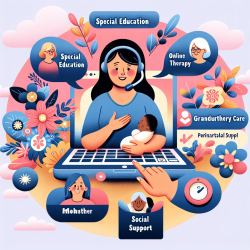Speech comprehension is a cornerstone of effective communication, significantly impacting individuals across various age groups, especially those with brain damage or cognitive impairments. A groundbreaking study titled Evaluation de la comprehension de discours: effets de l'âge et de la nature du texte by Bernadette Ska, Claude-Anne Turmel, and colleagues, offers valuable insights into how age and the complexity of texts affect speech comprehension. This research not only sheds light on the underlying mechanisms of discourse comprehension but also provides practical implications for speech-language pathologists (SLPs) aiming to refine their therapeutic approaches.
Understanding the intricate dynamics between age, text complexity, and comprehension abilities is crucial for developing targeted therapy interventions. The study's findings suggest that there are noticeable differences in the comprehension abilities between younger and older adults, highlighting the importance of tailoring therapy sessions to meet the specific needs of each age group. Moreover, the complexity of the text and the type of inferences required for comprehension play a significant role in how individuals understand discourse.
For SLPs, these findings underscore the necessity of selecting appropriate text materials and comprehension activities that align with the cognitive capabilities of their clients. By incorporating texts of varying complexities and focusing on high-level inference generation, therapists can significantly enhance the efficacy of their interventions. Additionally, understanding the impact of aging on comprehension can guide SLPs in creating more effective communication strategies for older adults.
Implementing Research Outcomes in Therapy
- Assessment and Material Selection: Begin by assessing the client's current comprehension levels and their ability to generate inferences. Use texts that gradually increase in complexity to challenge their comprehension skills while ensuring the content is age-appropriate and engaging.
- High-Level Inference Training: Incorporate exercises that focus on generating high-level inferences from texts. This could involve predicting outcomes, understanding implicit meanings, and drawing conclusions beyond the explicit content. Such activities encourage deeper processing of information and enhance overall comprehension.
- Age-Specific Strategies: Develop age-specific intervention strategies that acknowledge the unique challenges faced by different age groups. For younger clients, focus on building foundational comprehension skills through interactive and dynamic texts. For older adults, incorporate discussions that connect text content to personal experiences and knowledge, facilitating better integration of new information.
- Encouraging Further Research: Stay informed about the latest research in speech comprehension and cognitive aging. Engage in professional development opportunities to explore new therapeutic techniques and share successful strategies with colleagues.
Conclusion
The research by Ska, Turmel, and colleagues provides critical insights into the factors influencing speech comprehension across different ages and text complexities. For SLPs, applying these findings in therapy can lead to more personalized and effective interventions. By considering the individual needs of clients and incorporating evidence-based strategies into practice, therapists can significantly improve the communication abilities of those they serve.
Embracing a research-informed approach to therapy not only enhances clinical outcomes but also contributes to the ongoing development of the field. As we continue to uncover the complexities of speech comprehension, let us remain committed to advancing our understanding and improving the lives of those with communication challenges.
To explore the original research and gain deeper insights into the study's implications for speech comprehension therapy, please follow this link: Evaluation de la comprehension de discours: effets de l'âge et de la nature du texte.










